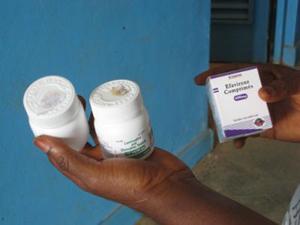Tracing the journey of AIDS drugs
Anti-retroviral drugs at the health clinic in Grabo. (Image: The World)
President Bush’s Emergency Plan for AIDS Relief — or PEPFAR — has supported life-saving treatment for more than 2.1 million men, women and children living with HIV/AIDS around the world. But despite the success so far, delivering the drugs remains a Herculean task in the developing world.
"The World’s" David Baron explores the challenge of delivering AIDS drugs in Africa by retracing the journey of a bottle of pills from a factory in India to a patient in Ivory Coast. En route, he introduces Grace, the woman for whom the U.S. health initiative is literally life saving. She lives in Grabo, a small village thousands of miles away from the plant in Cipla, India, that manufactured the pills responsible for her newfound health. Between that plant and the small health center Grace visits are inefficient bureaucracies and strained government resources, dedicated bureaucrats and health care providers, bad roads and intermittent electricity, and the threat of organized crime rings waiting to strike.
Still, Ivory Coast is seeing the health of its people improve. Grace is one of about 60,000 AIDS patients who are receiving treatment there.
PRI’s "The World" is a one-hour, weekday radio news magazine offering a mix of news, features, interviews, and music from around the globe. "The World" is a co-production of the BBC World Service, PRI and WGBH Boston.
